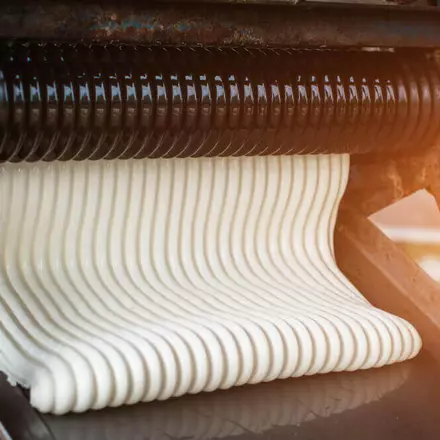HGF
Uses a customized solution of Jeeves ERP that is unusual in several respects, including that the ERP system is directly integrated with the manufacturing and mixing machines.

HGF chose Jeeves to continue developing as a world-class rubber company
In barely 10 years, Halmstad-based rubber products manufacturer HGF AB has gone from a traditional rubber company to an innovative, award-winning business that lives by the slogan “a world-class rubber company".
In May 2016, HGF took the next step in becoming an even stronger partner to its customers in sectors such as the automotive, energy and mining industries; a step taken by switching to the Jeeves enterprise resource planning (ERP) system. This turnkey solution, customised in collaboration with Jeeves consultants, is unusual in several respects; for example, in that the ERP system is directly integrated with manufacturing and blending machines.
In 2009, HGF was awarded the Halländska Lean Prize, in 2011 the company took second place in the Swedish Lean Prize and in autumn 2015, won the Halmstad Global Export Award.
Focus on the customers
The company’s motto “Lean on Us” sums up its entrepreneurial and team spirit, as well as the customer focus that prevails throughout HGF. The company has many customers of over 20-years standing and specialises in meeting their needs for rubber products that seal, dampen and protect. The company is also able to call upon long experience of 2k injection moulding, in which two materials – for example, two different rubber materials or rubber and metal – are combined. The company’s Halmstad operation employs some 100 people, while they also operate a complementary production unit in Latvia that largely manufactures products for the automotive industry.
The company’s investment in becoming a world-class rubber company was launched in 2006 with the introduction of HGF Production Systems (HPS), based on lean production principles. Simple, robust processes aimed at “connecting everything” proved to be the key to a successful lean approach. Procedures and systems for controlling, monitoring and improving production were built up. All employees were involved and trained. Results were quick in coming in the form of significant reductions in inventory, freed-up factory space for production, greater efficiency and improved delivery precision.
Real-time management on the shop floor with KPIs presented automatically
HGF is a company characterised by a strong will to innovate and the ambition to continuously improve extends to administrative processes. A few years after first gaining recognition as a leading exponent of lean principles, the company asked itself: Where next? Can we link HPS with our administrative processes? A needs and requirements analysis conducted in 2012 only confirmed what was readily apparent to management regarding changes to the company’s administrative systems environment.
- Over the years, we had accumulated miscellaneous systems, the downside for staff being that they were required to jump between various programs, which was of course not a particularly efficient way to work. One simple but important business impact we set ourselves was to be able to contain as much as possible in a single enterprise resource planning system. We chose Jeeves because it fulfilled the basic requirements of our main processes; however, one particularly important reason was its flexibility. Our development will not cease and we need an ERP system that can change as our business evolves, says Joakim Nordin, CFO of HGF.
Once Jeeves is operational in Halmstad, it will have some 50 users. Stage two will see the Riga production unit integrated with the solution. Jeeves will simplify many procedures and employees on the factory floor will eventually have a completely new real-time management (RTM) tool.
Simple and robust processes
- One of the factors behind succeeding with Lean is to move responsibility out into the organisation; employees then feel that they are involved and can exert influence and make proposals. We strive after simple, robust processes. Deviations in production should be addressed quickly. To be even more on the ball, we must also get information out into the organisation, automatically in real time. Here, we will use Jeeves and QlikView to create a visual system that allows us to see what is in the production queue and the situation in terms of production goals on screens beside every machine, explains Joakim.
HGF’s Halmstad machine park includes everything from blending machines and 20 or so rubber presses, to the company’s own toolmaking machines. The pilot project, beginning in 2016, will select a group of rubber press machines on which the integrated Jeeves-QlikView-Axxos solution will be tested. Jeeves will also be integrated with blending machines. Recipes and priority control for various blends will be sent from Jeeves to blending machines that then send production reports back to Jeeves.
A five-strong project group is working to implement Jeeves at HGF. The project group members are responsible for the functions sales, purchasing, logistics, production and finance. The common ambition is to reinforce the company’s position as a world-class rubber company.
HGF puts a great deal of work into visualisation, something that applies throughout the organisation. Planning and monitoring of activities and KPIs, everything will be entered in Jeeves and presented in QlikView.
One important business impact is improved project management
- When a project is set up in Jeeves, we also want to add activities to the project participants Outlook calendars. Everyone can then plan their own work schedule. Our customer projects are cross-functional and involve many people, so it is naturally important that everyone stays on schedule. A visual system for tracking the status of projects has already been developed and will now be set up in QlikView. The overall effect will be that we gain more efficient project management and can be an even stronger partner to our customers, concludes Joakim Nordin.